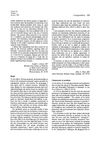 March 2024 in “Dermatologic therapy”
March 2024 in “Dermatologic therapy” Fire Needle Therapy may help bring back skin color in vitiligo by affecting cell growth signals.
 February 2024 in “Recima21”
February 2024 in “Recima21” Covid-19 can cause hair loss due to immune and psychological factors.
 February 2024 in “Journal of dermatology”
February 2024 in “Journal of dermatology” CGF therapy may help hair regrowth and improve scars in DLE patients.
 January 2024 in “Dermatologic Therapy”
January 2024 in “Dermatologic Therapy” PRP therapy with specific growth factors improves hair density and thickness in androgenic alopecia.
 September 2023 in “Nature Communications”
September 2023 in “Nature Communications” Immune cells are essential for skin regeneration using biomaterial scaffolds.
 July 2023 in “Journal of lasers in medical sciences”
July 2023 in “Journal of lasers in medical sciences” Red laser therapy helped regrow hair in an alopecia areata patient within 21 days.
 December 2022 in “Rossijskij žurnal kožnyh i veneričeskih boleznej”
December 2022 in “Rossijskij žurnal kožnyh i veneričeskih boleznej” New treatments for child hair loss due to immune issues are effective but not yet officially approved.
 October 2022 in “Journal of ophthalmology”
October 2022 in “Journal of ophthalmology” Light therapy may improve eye conditions by stimulating cell activity and increasing oxygen availability.
 July 2022 in “medRxiv (Cold Spring Harbor Laboratory)”
July 2022 in “medRxiv (Cold Spring Harbor Laboratory)” Satoyoshi syndrome is likely an autoimmune disease that mainly affects young women and improves with immune-related treatments.
 March 2022 in “Women's health issues”
March 2022 in “Women's health issues” The conclusion is that women are heavily affected by autoimmune skin diseases, face significant challenges, and need better research, treatments, and healthcare policies.
 January 2022 in “International Journal of Biology Pharmacy and Allied Sciences”
January 2022 in “International Journal of Biology Pharmacy and Allied Sciences” Autoimmune diseases cause the immune system to attack the body, and management varies as some are curable and others are not.
 December 2021 in “International Journal of Biology Pharmacy and Allied Sciences”
December 2021 in “International Journal of Biology Pharmacy and Allied Sciences” Autoimmune diseases cause the immune system to attack the body, and management varies as some are curable and others are not.
 April 2021 in “Sohag Medical Journal”
April 2021 in “Sohag Medical Journal” Alopecia areata is an autoimmune condition causing hair loss, linked to genetic factors and immune system issues, with no cure yet.
 March 2021 in “bioRxiv (Cold Spring Harbor Laboratory)”
March 2021 in “bioRxiv (Cold Spring Harbor Laboratory)” A specific immune response helps control mite populations on the skin, maintaining healthy hair follicles.
 March 2019 in “Applied sciences”
March 2019 in “Applied sciences” Laser therapy might help regrow hair in alopecia totalis better than steroids alone.
 July 2018 in “British Journal of Dermatology”
July 2018 in “British Journal of Dermatology” Hair regrowth was seen in 83% of children with alopecia, immune system plays a role in the condition, and various treatments showed effectiveness for hair and nail disorders.
 April 2018 in “Journal of Investigative Dermatology”
April 2018 in “Journal of Investigative Dermatology” Older mice healed wounds better but lost more weight and might have weaker immune systems afterward.

Hormones, especially testosterone and DHT, are key for penis development and function, and testosterone therapy may help with erectile dysfunction in those with low levels.
 November 2015 in “European Journal of Inflammation”
November 2015 in “European Journal of Inflammation” Cicatricial alopecia, a permanent hair loss condition, is mainly caused by damage to specific hair follicle stem cells and abnormal immune responses, with gene regulator PPAR-y and lipid metabolism disorders playing significant roles.

Low-level laser therapy combined with Neoptide improved hair regrowth better than either treatment alone in rats.
January 2005 in “Farmaceutski glasnik” Minoxidil and finasteride are key treatments for hair loss.
 October 2003 in “Journal of Investigative Dermatology Symposium Proceedings”
October 2003 in “Journal of Investigative Dermatology Symposium Proceedings” Mice treatments didn't grow hair, a patient treatment may affect immune response, and people with hair loss often feel anxious or depressed.
 January 1989 in “Journal of The American Academy of Dermatology”
January 1989 in “Journal of The American Academy of Dermatology” Psoriasis patients have immune cells that respond more strongly to signals and stimuli due to an intrinsic cellular defect.
 July 2020 in “Bioinformatics and Bioengineering”
July 2020 in “Bioinformatics and Bioengineering” Found key genes affecting hair loss, immune response, and skin development; more research needed for better treatments.
 179 citations,
April 2012 in “Nature Communications”
179 citations,
April 2012 in “Nature Communications” Regenerated fully functional hair follicles using stem cells, with potential for hair regrowth therapy.
 120 citations,
October 2007 in “Clinical Interventions in Aging”
120 citations,
October 2007 in “Clinical Interventions in Aging” Estrogens help reduce skin aging, and SERMs might offer similar benefits without the risks of hormone therapy.
 77 citations,
July 2013 in “Best Practice & Research in Clinical Obstetrics & Gynaecology”
77 citations,
July 2013 in “Best Practice & Research in Clinical Obstetrics & Gynaecology” Menopause reduces skin collagen and elasticity, and while estrogen therapy can help, its risks require careful consideration.
 70 citations,
February 2015 in “Expert Opinion on Drug Discovery”
70 citations,
February 2015 in “Expert Opinion on Drug Discovery” Topical drugs and near-infrared light therapy show potential for treating alopecia.
 55 citations,
April 2010 in “Cancer and Metastasis Reviews”
55 citations,
April 2010 in “Cancer and Metastasis Reviews” TGFβ's manipulation of inflammation and immune cells affects cancer spread, suggesting new treatment strategies and biomarkers.
 43 citations,
February 2019 in “International immunology”
43 citations,
February 2019 in “International immunology” Special immune cells called Regulatory T cells help control skin inflammation and repair in various skin diseases.





























